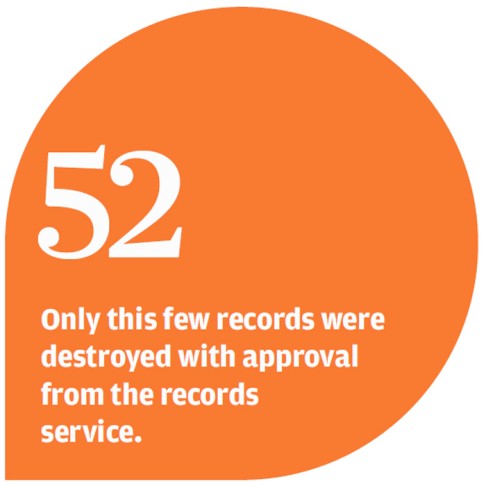
Pressure on ICAC to give up records
The watchdog is still keeping all the important data to itself even though they may be of historical value, says former records director
The government's lax archival policy again came under fire yesterday when it was revealed that the anti-graft watchdog had destroyed 78,000 records without archivists' assessment.

Despite a mandatory requirement imposed on it since 2011 to hand over its programme records only 500 "administrative files" will be included when the ICAC supplies its first batch of files to the records service for appraisal in August.
"This means probably nothing juicy or sensitive will be surrendered by the ICAC," former records service director Simon Chu Fook-keung said.
"It is still keeping all the important programme records to itself even though they may be of historical value."
He said administrative records were related to recruitment, finance and procurement and normally of less historical value.
The figures were given by Chief Secretary Carrie Lam Cheng Yuet-ngor in reply to a question by Labour Party lawmaker Cyd Ho Sau-lan.
There is no archival law in Hong Kong and those campaigning for one say the legislation is needed to lay down rules for and penalities against public officers destroying files with historical value.
The law would also allow public access to the files.
Lam said the destruction of the 78,000 records took place before an administrative code on archival management for government departments was applied to the ICAC in 2011.
Since then, 52 records had been destroyed with approval from the records service.
Of the files destroyed before 2011, 51,000 were programme records of closed cases.
The lack of an archive law means the watchdog now faces no consequences even though it keeps files to itself.
Chu said all sorts of records, including criminal investigations, should be appraised by the Government Records Service.
There had been precedents, including the file on the probe into the suspicious death of police inspector John MacLennan who was found with five gunshot wounds to his chest in 1980.
The ICAC maintains 162,000 records, of which 130 are related its establishment in 1974.
Ho said the files about the birth of the ICAC were of historical value as the public saw its establishment as part of the success story of Hong Kong and people took pride in the anti-corruption work.
"Why does the administration allow the ICAC to keep those files?" she asked.
"It seems the ICAC is a kingdom on its own," she said.
Liberal James Tien Pei-chun asked whether past cases featuring celebrities and top officials had already been destroyed.
"Those investigations were often started in a high-profile manner and then died down and we don't know whether they're closed without a conclusion," Tien said.
Lam was unable to answer.
She said only that the ICAC would draw up a draft disposal schedule for the Government Records Service.

